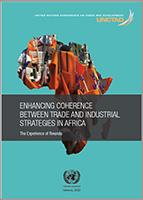
Recent research indicates that Rwanda needs to foster the development of productive capacities to enhance prospects for achieving its development vision and build resilience to current and emerging shocks.
The government recognizes the importance of developing productive capacities and diversifying the economy and has incorporated these as priorities in its development strategies. However, progress has been modest as reflected in the very limited role of manufacturing activities in the economy and in exports.
It is also reflected in the low share of Rwanda in global trade and industrial output relative to its share of global population. Several factors have been adduced for the low levels of diversification and productive capacities in Rwanda ranging from the small size of domestic markets and high trade costs associated with being landlocked to infrastructure bottlenecks, shortage of raw materials, skills gap, finance constraints and challenges in domestic policy design and implementation.
This paper focuses on the role of trade and industrial policies in fostering productive transformation in Rwanda. It identifies areas where there is the need for policy action to make trade and industrial policies more consistent with the goal of diversification and development of productive capacities.
It also offers recommendations on how to make trade and industrial policies more supportive of the goal of productive transformation and enhance prospects for achieving Rwanda’s vision of being an upper middle-income country by 2035 and a high-income country by 2050.


